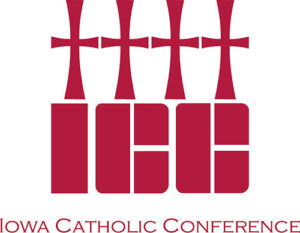 By Tom Chapman
By Tom Chapman
For The Catholic Messenger

Before Iowa’s legislative session began on Jan. 13, Iowa Catholic Conference staff met with legislative leaders to advocate for priorities of the ICC, the public policy voice of Iowa’s bishops. These priorities included preschool access, immigration concerns, conscience rights for medical professionals, probation reform, maternal health care and addressing the online black market for abortion pills.
More than 1,000 bills were filed in the House, at least 20% more than “normal.” The Senate had more than 600 bills, also a large increase. Any bill that failed this year is eligible for consideration again next year. Here is a synopsis of the session:
Education
- All students attending a nonpublic school are now eligible to receive an Education Savings Account (ESA) scholarship in the fall. ESA registration, which opened April 16, concludes June 30. Expansion of the program for the 2025-26 school year has an estimated cost of $316 million. The legislature approved a 2% increase in public school funding, which meant a 2% increase in the ESA amount for parents — $7,983.
- The ICC collaborated with the Iowa Association of School Boards, the Iowa Association of Christian Schools and other groups in support of 100% per-pupil funding for preschool students. Currently, preschoolers receive 50% of the K-12 per pupil funding amount. The proposal did not advance.
- The ICC has also been working with legislators and the governor for several years to find additional pathways for Catholic preschools to participate in the state-funded preschool program. Community providers can access the program only through a public school district.
SF 445, supported by the ICC, would have authorized community providers to apply directly to the state Department of Education for funding. The bill also set up a “childcare continuum” pilot program between state-funded preschools and childcare centers. The ICC thinks the bill failed in part because of concerns it would hurt childcare centers by taking away some of their business.
- The ICC advocated successfully for state money “generated” by nonpublic school students for media and educational services to be sent to an Area Education Agency for services to those nonpublic school students.
- HF 870 — Religious Instruction Release Time. The law requires all schools to release students for religious education upon request. It makes little sense to require a religious school to allow a student to leave the school for religious education.
Human life and dignity
- The ICC supported House File 391, the so-called “Baby Olivia” bill that requires middle and high school curriculum to include a three-minute video showing fetal development. This was a priority of the pro-life coalition in Iowa. The bill became law.
- The ICC opposed SF 320, which would allow the death penalty for the murder of a peace officer on duty. It did not become law.
- HF 775 would have required abortion providers to inform women about the possibility of reversing the effects of abortion medication and require the pills to be provided through a clinic, medical office or hospital. The bill did not become law.
- HF 878, a bill that the ICC supported to limit “payday lending” interest rates to 36%, passed the House Commerce Committee. The state banking division reports that most customers of payday lending businesses have had 12 or more loans with an average annual percentage rate of 250%. Work on the bill will continue during the interim.
- HF 570, which offers discharge, educational and workforce credits to reduce an individual’s probation term, passed the House but did become law. The ICC supported the bill, aimed at helping offenders reintegrate into society sooner without undermining public safety. The Senate Judiciary Committee is generally not friendly to legislation that could benefit offenders, Chapman said.
- HF 864, sought to protect minors by requiring adult websites to perform reasonable age verification of individuals attempting to access obscene material. The bill, which the ICC supported, did not make the cut.
- House File 248, which became law, requires employers to treat employees who adopt a child under 6 years of age in the same manner as a biological parent for purposes of employment benefits. The ICC supported the bill because adoption helps to build families, providing a loving and supportive environment for children to grow and thrive.
Healthcare and more
- SF 615, which the ICC opposed, is a new law that will impose work requirements on many of the 180,000 participants in the Iowa Health and Wellness Plan, the “Medicaid expansion” population. The healthcare plan provides affordable health coverage through Medicaid to Iowans ages 19-64 whose income does not exceed 133% of the federal poverty level.
About 75% of Iowa’s Medicaid recipients are already working. Those who are not often face barriers such as lack of education, struggles with mental health, substance abuse, or a criminal conviction. Many recipients work in low-wage industries with low rates of employer-sponsored insurance. With the new law, eligibility for Medicaid could change regularly depending on how a person’s work hours change outside of their control. These requirements also apply to the SNAP (food stamp) program.
- One of the ICC’s top priorities — and a successful one — was the defeat of HF 572, which would have created a new crime of “human smuggling” in Iowa. Among other issues, the ICC expressed concern about the bill’s potential to criminalize providing basic charity to immigrants. It is already against federal and state law to traffic in humans.
- HF 571, the “Med Act,” did not become law. It would allow a medical professional or health care institution to refuse to perform a medical service (not including emergencies) for conscience reasons. The ICC supported the bill.
March for Life
Plan to participate in the Iowa March for Life on June 21, which begins inside the State Capitol in Des Moines at noon with educational booths and music followed by a rally at 1 p.m.
National Right to Life’s new president, Jennie Bradley Lichter, will be among the main speakers. A walk to the Supreme Court building and back (for cookies!) will follow the rally.
National concerns
The ICC is making an urgent request regarding Catholic Relief Services’ Food for Progress and McGovern-Dole Food for Education programs. The Administration has terminated all by two of the Food for Education feeding programs, cutting off daily meals for nearly 800,000 children in 11 countries beginning in July. For many, this was their only meal of the day. The ICC asks Catholics to contact their Congress members to insist that the Administration reverse the termination.








